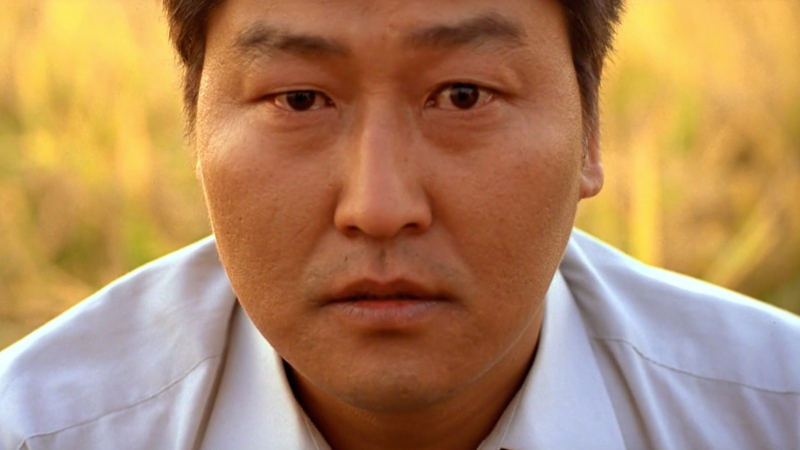Director – Bong Joon Ho – 2003 – South Korea – Cert. 15 – 131m
*****
Three cops attempt to track down a serial sex killer. Based on a real life, unsolved murder case... with Song Kang-ho – plays in LEAFF10 (London East Asia Film Festival 2025) with an In Conversation session with Cinematographer Kim Hyung-koo on Friday, October 24th
On one level, there’s nothing remarkable about Memories Of Murder, a crime movie about cops hunting a serial killer. This is a sub-genre done to death in Hollywood and elsewhere. On another level, however, it has the hallmarks of a really rich and strange talent getting hold of a well-worn formula and doing something fresh, new and original with it.
For one thing, it never dwells on the gore or fetishises the detail of the crimes. At the same time, like much Korean cinema, it never shies away from this material either. It’s unafraid to have an autopsy scene in which the pathologist discovers nine pieces of peach inside a corpse’s vagina but feels just as at ease that a testimony from a survivor throws up an important clue like, I didn’t see the killer’s face because if I had looked at him he’d have killed me, but I did notice he had soft hands.
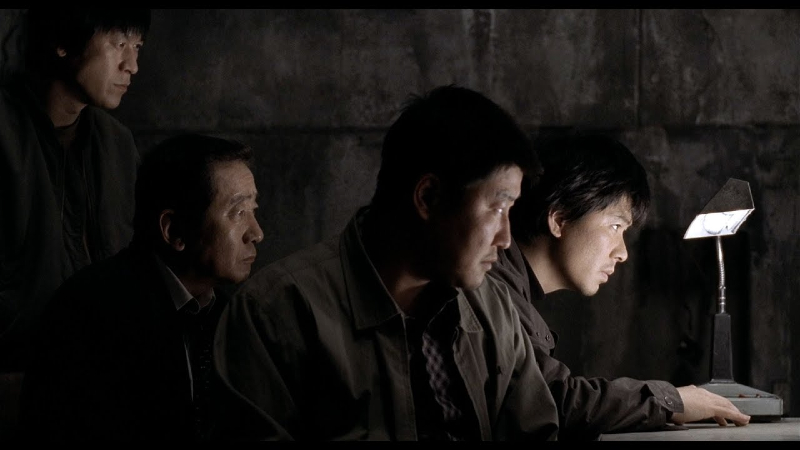
Director Bong Joon Ho (Parasite / 2019, Snowpiercer / 2013) isn’t particularly interested in taking us inside the head of the killer. His interest lies rather in on the one hand the group dynamics of the three cops on the case and on the other in how they go about solving or failing to solve an ongoing series of crimes. And somewhere behind that lie questions about the role of the police – what are they for and how well do they do their job?
The story opens in 1986 and is based on a real-life series of unsolved Korean murders in and around a small, rural town. Detective Park Doo-man (Song Kang-ho) is the cop leading the investigation frustrated by the force’s incompetence. The forensics people arrive too late at the narrative’s first rural crime scene to prevent a tractor driving over and obliterating a footprint left in the muddy roadway.
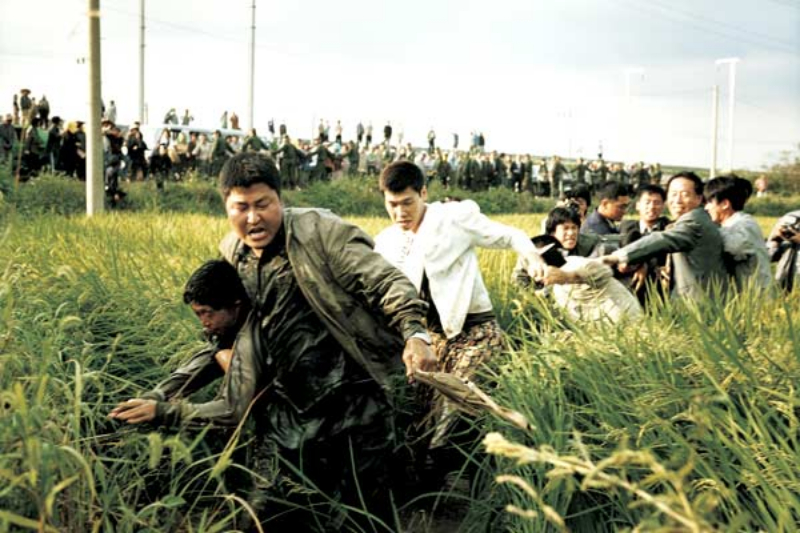
Detective Park over-relies on his own intuition in solving crimes. His partner Cho Yong-Koo (Kim Roe-ha from Default / 2018, A Bittersweet Life / 2005 and Bong’s own The Host / 2006) presumes suspects guilty until proved innocent and favours in custody brutality to exact confirmatory confessions. Cho also has a fairly hot temper and tends to fly off the handle.
The pair are clearly not a good mix and as likely to convict innocent people as actual criminals. Providing a foil to them is Detective Seo Tae-yoon (Kim Sang-kyung) from the capital Seoul who is more thorough in his examination of the evidence and determined not to convict innocent people by accident. However, even he gets it wrong sometimes in his desire to put criminals behind bars.
Suspects arrested who may or may not be the killer are mentally challenged man Baek Kwang-ho (Park No-shik) and factory worker, bookworm and radio listener Park Hyeon-Gyu (Park Hae-il).
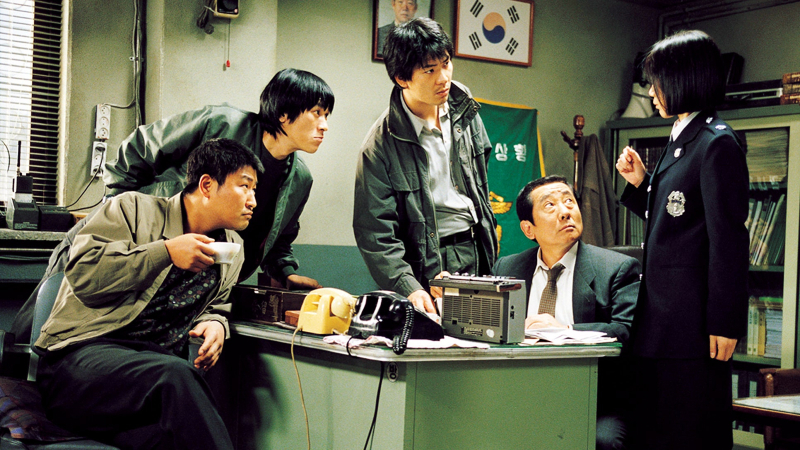
The film, made in 2003, is heavily male-dominated. A number of the women are (obviously) victims of the killer and we learn little more about them than that, except that most of them are unfortunates who happen to be in the wrong place at the wrong time. A police restaging of one slaying has a cop dressed as the female victim and a passing joke about his lack of female breasts. The desk policewoman at the station Kwon Kwi-ok (Kwo Sio-hi) is shown as a diligent type who works through procedure and evidence and makes invaluable contributions to investigations in progress, yet she’s very much a marginalised, secondary character.
A nurse walks home through as woods one night where the killer waits for a potential victim in the trees. At the tree, the nurse passes a schoolgirl going the other way. The perched killer’s point of view pans back and forth between the two females as he decides which one to abduct and kill. There’s a truly horrible moment as the one he hasn’t picked thinks she hears something (it’s the other being pulled into the trees), looks back, sees nothing and moves on. That moment when, perhaps, she could have done something if she’d known, intervened and saved a person’s life. A chilling and remarkable scene.
The nurse is a compelling character – she’s Detective Park’s lover Kwok Seol-yung (the late Jeon Mi-seon from Bong’s Mother / 2009) and from their conversations makes quite a bit of money from out of hours, self-employed prostitution with a number of regular clients.
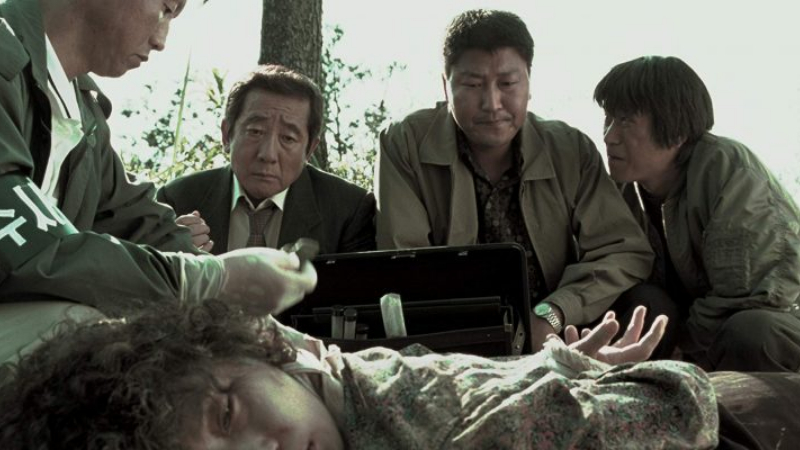
One narrative strand has the song Sad Letter playing on the radio on rainy days indicating the killer is about to strike again. This element links the film with other crime dramas which use radio and/or music tunes in similar ways. These include Hollywood’s Play Misty For Me (Don Siegel, 1971) where Misty is a song that DJ Clint Eastwood plays on the radio at a female listener’s request, which listener later stalks and attempts to kill him. Another is Hong Kong’s Hard Boiled (John Woo, 1992) in which a jazz standard is used as a coded message from heroic, on duty cop Chow Yun-fat to his police colleague girlfriend at the station.
There are numerous clever plot twists and turns in Memories Of Murder. Bong is concerned with police processes, with one interviewee suddenly being switched in the narrative from suspect to witness as two detectives realise his vivid account of a killing isn’t confession but reportage. This challenges the viewer in his/her judgements: do we, like the cops often do here, judge people as guilty before their guilt can be reasonably proven?
Memories Of Murder Memories Of Murder plays in LEAFF10 (London East Asia Film Festival 2025) with an In Conversation session with Cinematographer Kim Hyung-koo at 5pm on Friday, October 24th 2025; also available on Curzon Home Cinema.
LEAFF10 runs from Thursday, October 23rd to Sunday, November 2nd.
Trailer:
